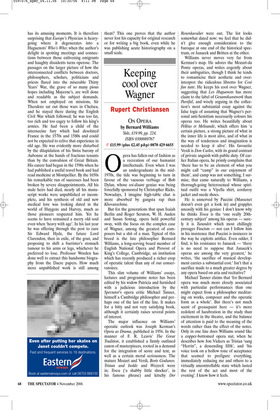Keeping cool over Wagner
Rupert Christiansen
ON OPERA by Bernard Williams Yale, £19.99, pp. 224, ISBN 0300089767 ✆ £15.99 (plus £2.45 p&p) 0870 429 6655 Opera has fallen out of fashion as a recreation of our humanist intellectuals. Even when I was an undergraduate in the mid1970s, the tide was beginning to turn in favour of the vacuous verbiage of Bob Dylan, whose soi-disant genius was being forcefully sponsored by Christopher Ricks. Nowadays, I imagine high-table chat is more absorbed by gangsta rap than Khovanschina.
But for the generations that span Isaiah Berlin and Roger Scruton, W. H. Auden and Susan Sontag, opera held powerful sway, with the focus on the complex case of Wagner, among the greatest of composers but a shit of a man. Typical of this breed is the late philosopher Bernard Williams, a long-serving board member of English National Opera and Provost of King’s College, Cambridge, an institution which has recently produced a richer crop of operatic talent than any of our conservatoires.
This slim volume of Williams’ essays, lectures and programme notes has been edited by his widow Patricia and furnished with a judicious introduction by the Spectator’s opera critic Michael Tanner, himself a Cambridge philosopher and perhaps one of the last of the line. It makes for a bitty and not very satisfying book, although it certainly raises several points of interest.
The major influence on Williams’ operatic outlook was Joseph Kerman’s Opera as Drama, published in 1956. In the manner of F. R. Leavis’ The Great Tradition, it established a firmly outlined canon of masterpieces, rooted in a demand for the integration of score and text, as well as a certain moral seriousness. The mature Mozart and Verdi, Boris Godunov, Tristan und Isolde and Wozzeck were in; Tosca (‘a shabby little shocker’, in his famous phrase) and kitschy Der Rosenkavalier were out. The list looks somewhat dated now: we feel that he didn’t give enough consideration to the baroque at one end of the historical spectrum, or Janacek and Britten at the other.
Williams never moves very far from Kerman’s map. He adores the Mozart-da Ponte operas, and writes cogently about their ambiguities, though I think he tends to romanticise their aesthetic and overinterpret the ridiculous libretto for Così fan tutte. He keeps his cool over Wagner, suggesting that Les Huguenots has more claim to the label of Gesamtkunstwerk than Parsifal, and wisely arguing in the collection’s most substantial essay against the false logic of assuming that Wagner’s personal anti-Semitism necessarily colours his operas too. He writes beautifully about Pelléas et Melisande, which offers him ‘a certain picture, a strong picture of what in the inner life is most alive, and of what in the way of tenderness and imagination is needed to keep it alive’. His favourite Verdi is Don Carlos, with its grand contrast of private anguish with public duty. Of earlier Italian opera, he primly complains that ‘there has to be an element of what you might call “camp” in our enjoyment of them’, and camp was not something, I surmise, that came naturally to Williams, a thorough-going heterosexual whose spiritual outfit was a Viyella shirt, corduroy jacket and suede shoes.
He is unnerved by Puccini (Massenet doesn’t even get a look in) and grapples uneasily with his genius: I don’t know why he thinks Tosca is the ‘one really 20thcentury subject’ among his operas — surely it is Turandot which most chillingly presages Fascism — nor can I follow him in his insistence that Puccini is insincere in the way he exploits artifice. Even odder, I find, is his resistance to Janacek — ‘there is no need to suppose that Janacek’s operas are among the very greatest,’ he writes, ‘the sacrifice of musical development carries a substantial cost.’ Isn’t that a sacrifice made to a much greater degree by any opera based on aria and recitative?
Michael Tanner claims that ‘for Bernard opera was much more closely associated with particular performances than one might expect from a philosopher meditating on works, composer and the operatic form as a whole’. But there’s not much scent of greasepaint here — it’s more redolent of lucubration in the study than excitement in the theatre, and the balance of attention is paid to the meaning of the words rather than the effect of the notes. Only in one line does Williams sound like a copper-bottomed opera nut, when he describes how Jon Vickers as Tristan ‘sang “Herrin”, a descending fifth’, and ‘his voice took on a hollow tone of acceptance that seemed to prefigure everything, immediately reducing me and others to a virtually uncontrollable state which lasted the rest of the act and most of the evening’. I know how it feels.


















































































































 Previous page
Previous page